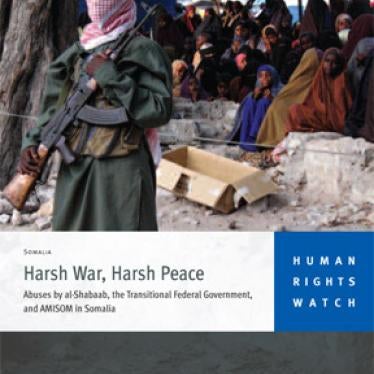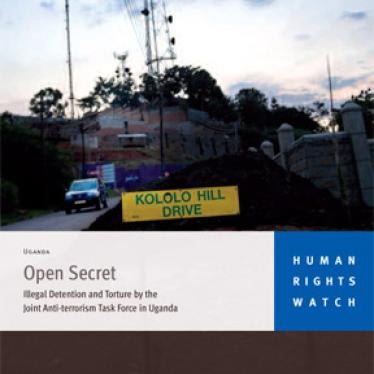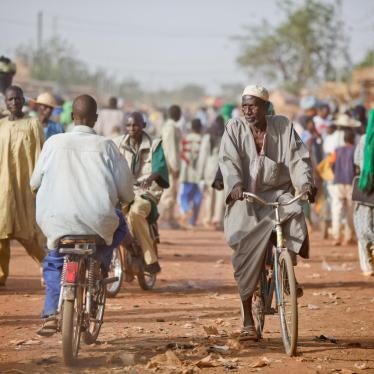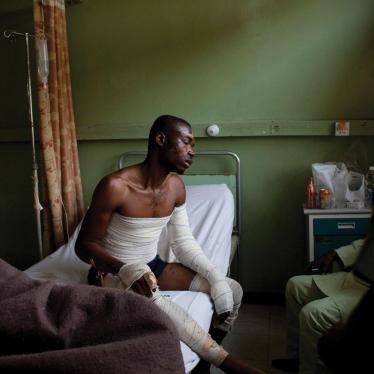(New York) -The bomb blasts that killed at least 76 people in Kampala on July 11, 2010, were a heinous attack on civilians and an assault on the basic tenet of the right to life, Human Rights Watch said today. Uganda and other regional governments should ensure that Somali refugee and Muslim communities are protected from potential reprisals or arbitrary targeting by law enforcement.
The two simultaneous bomb blasts hit an Ethiopian restaurant and a rugby club, where people had gathered to watch the World Cup final. Ali Mohamed Raghe, the spokesperson for the Somali Islamist armed group al-Shabaab, claimed responsibility for the bombings and threatened further attacks if Uganda and Burundi continue to supply troops to AMISOM, the African Union military force in Somalia that is backed by the United States, the United Nations, and the European Union.
"These bombings are an indefensible assault on the right to life" said Rona Peligal, Africa director at Human Rights Watch. "There is never any justification for such abhorrent attacks on civilians, and al-Shabaab should immediately stop targeting civilians in Somalia and the region."
Human Rights Watch has previously documented patterns of al-Shabaab attacks on civilians in Somalia, where the group is fighting the Transitional Federal Government. The Kampala bombings are the first time the insurgent group has claimed responsibility for an attack on civilians outside Somalia, although individuals aligned with al-Shabaab who are believed to have links to al Qaeda have been accused of deadly attacks on the US embassies in Kenya and Tanzania in 1998.
Concerns that al-Shabaab could strike outside of Somalia have increased over the past few months, and the attacks in Kampala may create further instability in an already-volatile region. Al-Shabaab has previously threatened attacks in Kenya, which borders Somalia and is host to more than 300,000 Somali refugees. It has also threatened attacks in another neighbor, Ethiopia, which intervened militarily in Somalia in 2006 to support the weak Somali transitional government.
Responses in the wake of the Kampala bombing, however, raise concerns that regional counterterrorism operations may adversely affect Somali refugees and Muslim communities already vulnerable to abuses from private citizens or host government security forces.
Human Rights Watch received credible reports that at least one person of Eritrean descent in Kampala was allegedly beaten by unknown assailants since the July 11 bombing and required medical treatment. Others from the Horn of Africa, including Somalis and Eritreans, have faced threats since the bombings. Recognizing the potential for reprisals, on July 14 President Yoweri Museveni made a welcome statement cautioning Ugandans not to collectively blame Somalis for the bombing.
Human Rights Watch urges the Ugandan government and other regional governments to ensure that all law enforcement operations are conducted in full accordance with international human rights standards.
"Understandably, police in Uganda and the region will be under immense pressure to bring those responsible for these horrific attacks to justice," Peligal said. "But authorities in the region also need to make sure that vulnerable refugee and Muslim communities are protected from reprisals - whether from private citizens or security forces - and that they strongly condemn such acts."
Human Rights Watch has documented serious abuses, including torture and extrajudicial executions, by Uganda's lead counterterrorism operatives, the Joint Anti-Terrorism Task Force. The task force, which draws members from the military, the police, and the intelligence organizations, routinely detains suspects for long periods of time without charge.
Most victims of these abuses are allegedly affiliates or members of a Ugandan Muslim rebel group, the Allied Democratic Forces, currently based in Congo. Ugandan police have claimed that the Allied Democratic Forces were possibly involved in the July 11 bombing, but the evidence for this allegation is unclear.
Background
Harakat al-Shabaab al-Mujahideen, also known simply as al-Shabaab ("the youth" in Arabic), is a Somali Islamist group that began as the military offshoot of the Islamic Courts Union, a coalition that controlled large parts of southern Somalia in late 2006. In December 2006, Ethiopian troops intervened in Somalia to support the Transitional Federal Government but the conflict intensified, with all parties committing serious violations of the laws of war, including indiscriminate attacks on civilians. Ethiopian forces withdrew from Mogadishu in January 2009.
Some of al-Shabaab's leaders and affiliates are allegedly linked to al-Qaeda. The United States, the EU, and governments in the region have expressed alarm about the group's expanding influence in Somalia. It is the most powerful single armed faction in Somalia, controlling more territory in south-central Somalia than any other group.








